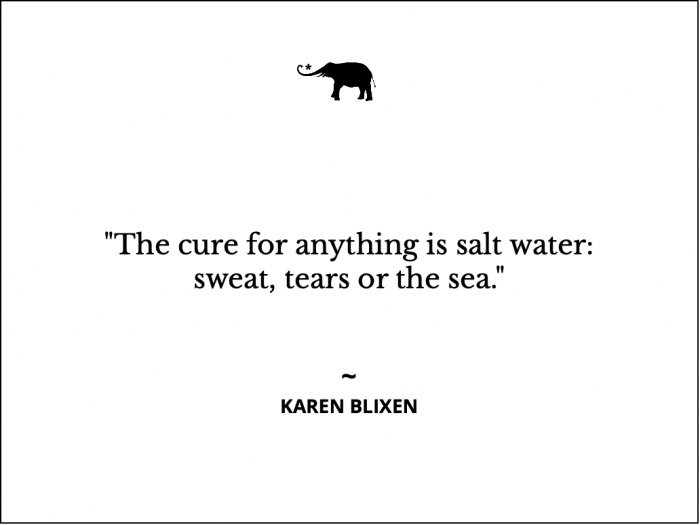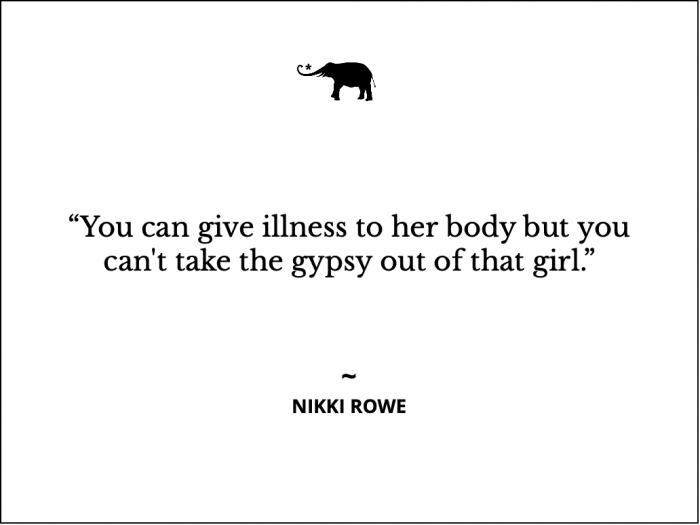View this post on Instagram
Part one: Why Perfectionism is a Response to Childhood Trauma.
Living with uncertainty, disorder, and the unknown feels outright scary for the perfectionist.
This can also be true for people with childhood trauma—perfectionist or not.
We want to know when, how, what—which could explain why we have anxiety, like, all the time.
The idea of surrender sounds like music to our ears. Ah, the thought of letting go and completely feeling free. But then, our perfectionist, anxious-riddled mind steps in and says, “But what if?”
It’s that constant tension that keeps us trapped and unable to go with the flow.
For me, I never knew I was so wound up all the time until I bought a one-way ticket to the other side of Australia and unleashed myself into the unknown.
It was this decision that opened a pandora’s box of questions:
>> Why was I living so controlled all the time?
>> Why did every aspect of my life feel so tight and rigid?
>> Why was I unable to breathe and let loose?
>> Why was life always this constant chase?
The unravelling of perfectionism
Growing up, I loved magazines. My favorite images were the beach bum chics—cheekbones sun-kissed from the Australian sun, massive sunglasses, sand beneath their feet, the ocean a blanket around their existence. I knew they were photoshoots, so it wasn’t about wanting the “perfect life.” It was the opposite.
I fantasized about being at the beach without a care in the world.
I craved freedom, salty hair, and that feeling the ocean gives us—a sense of bliss, calm, and a knowing that everything will be okay.
As I entered adulthood, my life was anything but carefree.
I pushed my body to extreme limits thinking I had to be skinny to be accepted and loved. I couldn’t leave the house without makeup, hair done, and a perfect outfit. As a result of extreme methods to stay lean, I struggled with chronic illness for four years.
I strived in my job, giving my all, only to be unappreciated for my efforts.
No matter how much I gave in my relationships, they always seemed to follow the same pattern—disappointments, letdowns, being ghosted, and a lot of crying.
I tried so hard to do everything “right” according to what we are “supposed” to do in society, but it felt like I was constantly failing.
The more I tried to control life, the more it evaded me. The more it evaded me, the more I tried to control it.
After a while, it becomes exhausting maintaining this high-strung life, and the body and mind dive into despair. Then, after a period of helplessness, we pull up our socks and try again. We go hard, push harder, and the cycle continues.
Deciding to quit my job, buy a one-way ticket and move across the country without a plan, house, or job to go to is like a big “no-no” for a perfectionist.
We might crave the feeling of totally abandoning our life and saying, “f*ck it,” but we quickly resume back to panic mode and order. We tell ourselves “one day,” and we convince ourselves that we need to do more, be more, and strive, just a little more, before we can do anything wild, fun, and free.
But I was fed up. I truly was. The doctors couldn’t help me either—I was a lost cause to them.
So I threw myself into the unknown and completely let go of every idea, plan, or vision I had for my life at that time. At that point, what did I have to lose? I could barely move due to relentless pain in my body daily. I was unhappy—and I was so tired. Oh, so tired.
The career, relationships, who I am supposed to be, my fitness—I completely surrendered it all. I wasn’t calm or centered, but I did have faith. Deep down, I knew I needed to do this.
After a few months of struggling to find my grounding in a new place, I was walking to the beach one day. Over the months (after years of dangerously controlling my weight through extreme exercise and diets), I had gained weight. I wasn’t confident in my body, but I decided to wear shorts and dared to display myself in public. As I walked, I felt exposed and vulnerable, worried that someone would see me. I felt ashamed for being heavier and out of shape.
Suddenly the words came to me, “How do you know if someone is thinking about you? You are not in their head. And, if someone ever puts you down for how you look, it’s their problem, not yours. They are not the people you need in your life anyway.”
I continued to walk, makeup free and legs wobbling, and I felt this sudden feeling of freedom for the first time in a long time.
I thought to myself, “Yeh, who actually cares?”
As my worry subsided, it dawned on me that I was walking to the beach, only a few minutes from where I now lived. I had found this beautiful apartment within the heart of the Gold Coast and things were falling into place. How on earth did a dream from my childhood come true without even planning it?
Within months my symptoms completely cleared too. Finally, after four years of dealing with multiple medical problems, my body recovered.
I was overcome with joy and ease. I felt like my authentic self started to surface, and I liked her. The more I embraced my true self and challenged these perfectionist tendencies, the more relaxed I felt and the more I let go of these ridiculously high, unattainable standards I was placing on myself.
And this is why perfectionism is a trap.
As perfectionists, we can often live in our heads, worried and constantly trying to control every aspect of ourselves and our lives. We believe we need to go above and beyond all the time to be accepted, embraced, and happy. We think we need to take extreme measures to stand out, be seen, and be valued.
But this mentality robs us of truly living, the power of the unknown, and our most authentic, deepest dreams. But, most importantly, it robs us of the greatest friendship we can ever have and build—the one with ourselves.
So, I share these pointers below ever so lightly. They are guides and ways to gently ease ourselves from a place of trying to be perfect to self-acceptance, a little less pressure, and going with the flow.
But please know that this is a journey. No one expects us to be perfect, and if anyone puts such pressure on us—it’s them who needs to deal with their own expectations. Not us.
When I returned to my everyday life, I immediately didn’t live like a carefree beach bum. Instead, I resorted to perfectionist ways, but the experience became a compass of what was possible for me—healing.
Slowly, I unraveled the messiness of perfectionism, falling more times than I could count. I still fall today, but getting up is much quicker and filled with a lot more kindness than before. As each layer comes off, a new sense of freedom sets in.
This is the journey of healing—a process, a discovery, a continuous renewal.
May this story and the below pointers be of benefit:
Six ways to overcome perfectionism and move beyond the yo-yo cycles:
1. Increase self-esteem.
As perfectionists, we can have low self-esteem and confidence, and we can rely on external approval and confirmation from people or results. Building self-esteem helps us to make better decisions, feel at ease with ourselves, and create our own path in life without needing to gain approval from others.
In both abnormal and sports psychology, one of the ways to help patients and athletes with trauma, self-esteem, and recovery is to enhance self-confidence which helps to reduce feeling of anxiety too.
A healthy natural way to boost ourselves is by pumping those endorphins and balancing our neurotransmitters through exercise and movement. Exercise and activities that make us feel good are crucial because as perfectionists we tend to worry, stress, and overthink which can exhaust our poor bodies and brains. Depression, trauma, and stress can be linked to low serotonin levels and imbalances within the brain. (Gould & Weignberg, 2015)
Feel-good activities help balance our mood and regulate our hormones. Moving helps us shake off nervous energy and centre ourselves too.
As perfectionists, feel-good activities may be benched or put off because we think we need to attend to other things or people before making ourselves feel good. If we have people-pleasing tendencies or anxiety around disappointing people, we are generally good at doing everything else well and neglecting ourselves. And we justify it too!
And for the perfectionists who are exercise fanatics—too much exercise can do the reverse. Learning to tune into our bodies and connect with ourselves helps us disengage from trends, and society’s idea of perfect, and instead healthily approach our health and fitness.
2. Don’t let the pressure build up.
As perfectionists, we can be extremely good at working under pressure and in stressful situations. We’re also good at procrastinating and then at the last minute, pulling through. Sometimes this works well, and other times it doesn’t. But working under pressure like this can result in a buildup of stress on the body and mind.
If we haven’t taken the time to release the stress regularly, it accumulates, putting us at risk of chronic illness, anxiety, mental disorders, and ailments.
If we don’t balance our lives with enjoyable activities, we become like a pressure cooker that explodes without adequate venting. We need release valves in our life—space to breathe, let loose, and shake off the stress.
It may also explain why addictive behaviors are prevalent for perfectionists. We crave feeling good because we are so wound up and need relief. A quick fix may seem like a good idea, but we are often left feeling the same way. It is better to opt for activities that we can practice long-term.
3. Self-regulation is empowering.
When we self-regulate, we seek to understand ourselves and our behaviors to acquire balance in how we respond to situations in our lives. Ramped-up emotions like worry, fear, and anxiety can lead to regretful or impulsive reactions due to past trauma and experiences. But often, we are unconscious to our triggers and deep-seated pain until we begin to self-regulate and develop self-awareness.
When children are not taught to self-regulate, they learn survival mechanisms to protect themselves from the stress and burden of feeling powerless. Those survival mechanisms are lifesavers during those times. But if we continue operating in this way later in life, they become hindrances. (Gould & Weignberg, 2015)
We can be grateful that our brain kicked in and helped us when we couldn’t help ourselves. We can also choose to help ourselves by learning to self-regulate and implement strategies that help us deal with stressful situations and relationships.
It is important to have self-compassion toward ourselves as we go through life too:
“Individuals who are self-compassionate recognize that imperfections, faults, and difficulties in life are universal and are therefore less likely to be self-critical, harsh, and judgmental.” (Madeleine Ferrari et al. 2018)
4. Do something wild, fun, and creative.
We need to regularly invite spontaneous, unplanned activity into our lives, not once in a blue moon. This is an essential antidote for a perfectionist because it’s usually the thing we neglect, put off, or are most afraid of—letting go of control.
And no, we don’t need to book a one-way ticket across the other side of the country to do this. That was part of my journey, but the real work started when I returned to my home state. It was easier being carefree when I was so far from everyone and everything I knew. Unfamiliar territory can spark curiosity, excitement, and a desire to explore.
So when I returned to my home state, I took up hiking, unplanned activities, and hobbies. I introduced fun back into my life and started to appreciate how these pockets of time are just as important as the planned, routine things. They helped me get in touch with the real me.
There’s something magical about walking in nature—it reflects back to us who we truly are. I have never felt more alive and free than being amongst the trees, with an open path in front of me, and no plan other than to walk and embrace whatever comes next.
5. Be values driven.
As perfectionists, we are going through life battling between our authentic self and conditioned self. The real us is underneath the conditioning and needs a second chance at life—and we are the ones to offer that chance. This means parenting ourselves and giving the inner child in us an opportunity to be loved, accepted, and embraced for who we are.
It is challenging to listen to our intuition when we have been taught to shut it off, ignore it, and listen to the adults instead of ourselves. So, where do we begin loving and trusting ourselves if that was never practiced or developed?
A values-driven life is about us figuring our own values and being driven by them. They are helpful when our “perfectionist” self wants to take over. Think of values as a grounding and home to return safely to. For me, my dominant value is integrity. So I base my decisions on that value. It’s my true north.
Being values-driven helps us let go of those perfectionist tendencies and address belief systems that we adopted, but are not innately our own. It helps us define ourselves and our own lives according to what we believe is valuable to us.
6. Develop inner trust.
The perfectionist’s biggest downfall is a lack of self-trust. We learned to value and take on other people’s opinions over our own. So, later on in life, we have difficulty trusting our instincts and inner guidance. Our intuition may prompt us, but we doubt ourselves or seek confirmation from others. Everyone will have different opinions according to their own experiences and perspectives. This leaves us open to making decisions that are not uniquely for us—nor the best for us.
Incredible things happen when we develop inner trust and validate our own voice, needs, and intuition. We start to move past our conditioning limitations and make strong, bold, and authentic decisions. Our path starts to look beautiful, light, and adventurous rather than pressured, heavy, and stressful.
By trusting our inner guidance, we can also begin to understand how this perfectionistic self works and how it has held us back so many times in our lives. Learning about this and trusting myself has also helped me have more grace toward myself. I began to understand why I was on this all-or-nothing loop and why I felt like I was going nowhere no matter how much I was doing in my life.
In my next article, we’ll talk about how when life starts to feel good, we suddenly feel dread or like things are too good to be true.
Let me know in the comments how these are helpful and if you have your own pointers to add, please do.
~
Ferrari M, Yap K, Scott N, Einstein DA, Ciarrochi J (2018) Self-compassion moderates the perfectionism and depression link in both adolescence and adulthood.
Gould, D. & Weignberg, R. (2015), Foundations of Sport and Exercise Psychology.


 Share on bsky
Share on bsky






Read 14 comments and reply